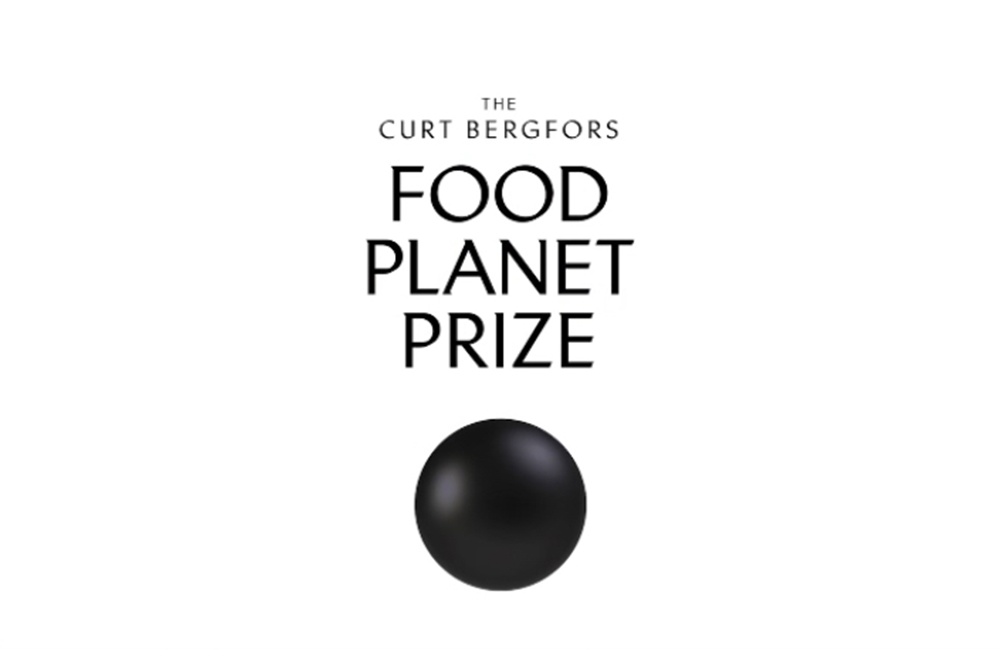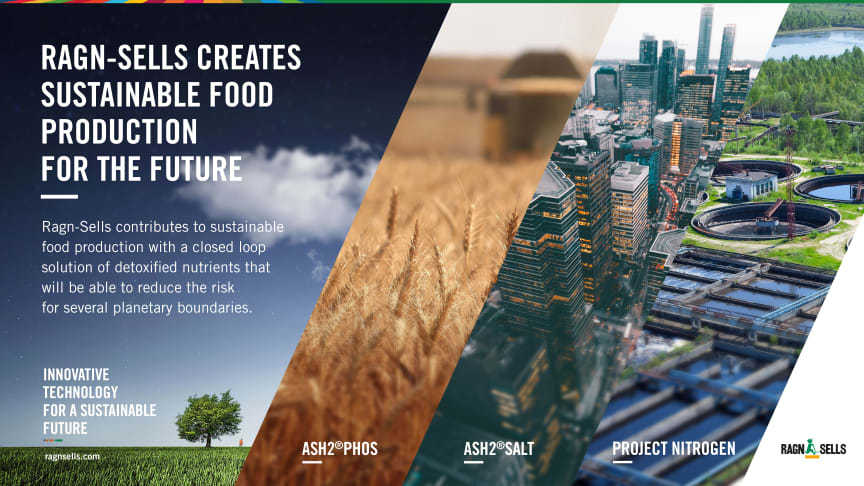Ragn-Sells named finalist for world’s largest environmental award for the second time
 Ragn-Sells and EasyMining have been named as one of nine finalists for the 2023 Curt Bergfors Food Planet Prize.
Ragn-Sells and EasyMining have been named as one of nine finalists for the 2023 Curt Bergfors Food Planet Prize.Environmental company Ragn-Sells and its innovation company EasyMining have been named as one of nine finalists for the 2023 Curt Bergfors Food Planet Prize. Like in 2022, the selection jury recognises their technologies for recycling key fertiliser nutrients from waste. The eventual winner of the world's largest environmental prize will be announced on June 9 and receive a prize sum of 2 million US dollars.
– If we are serious about creating a sustainable society, we have to start using the raw materials we already have, over and over again. Many raw materials of critical importance exist in abundance in our waste but are never put to use. We are extremely proud that the jury once again recognises our efforts to recirculate nutrients from waste streams and prevent them from ending up in the wrong places in our ecosystem, said Pär Larshans, Director of Sustainability at Ragn-Sells.
Ragn-Sells and EasyMining were also selected as finalists for the prize in 2022. This year, the same entry is recognised: Three separate, patented methods for recovering and recycling the three main nutrients crucial to agricultural fertiliser. These technologies are known as Ash2Phos for phosphorus, Aqua2N for nitrogen, and Ash2Salt for potassium.
– Today's sourcing of these three nutrients is deeply problematic. Every year, its impact on climate change, pollution, and geopolitical issues grows. With our methods, we aim to contribute to a comprehensive reform of the entire global food system, said Anna Lundbom, Chief Marketing Officer at Ragn-Sells’ innovation company EasyMining, which has developed the technologies.
- Phosphorus comes from phosphate mines. In addition to the large climate impact of this method, most of the world’s known phosphate reserves are polluted with heavy metals like cadmium and uranium. Still, the majority of phosphorus-rich sewage sludge goes to waste in landfills. The Ash2Phos technology extracts more than 90 percent of the phosphorus from incinerated sludge while getting rid of pollutants.
- Nitrogen fertiliser is produced by fixating nitrogen from the atmosphere. The standard method is more than 100 years old and runs on fossil gas, contributing to enormous greenhouse gas emissions. At the same time, the nitrogen in sewage is simply released back into the air by wastewater treatment plants. The Aqua2N technology captures the nitrogen at the plant in a form instantly applicable as fertiliser, creating a loop.
- Potassium, like phosphorus, is mined, primarily in Canada, Russia, and Belarus. The Ash2Salt technology instead extracts potassium from fly ash, a by-product of energy production from the incineration of waste. Until now, fly ash has simply been landfilled and its resources wasted. The world’s first full-scale Ash2Salt facility was inaugurated on April 21 by Sweden’s Minister for Climate and the Environment, Romina Pourmokhtari.
– Just over the last year, threats to the global food supply have grown as the war in Ukraine has escalated and climate change has led to agricultural challenges. Recycling agricultural nutrients is more crucial than ever to our ability to feed everyone without wrecking the planet, said Mr. Larshans.
The Food Planet Prize winner will be selected by a jury of world-leading food system specialists located on four continents, chaired by Professor Johan Rockström, Director of the Potsdam Institute for Climate Impact Research, and Magnus Nilsson, the Director-General of the Food Planet Prize. The winner announcement ceremony is scheduled to take place on 9 June 2023.
The Curt Bergfors Foundation was established in 2019 by the Swedish entrepreneur Curt Bergfors, founder of the restaurant chain MAX Burgers. The Curt Bergfors Food Planet Prize is now the world’s largest environmental award, aiming to accelerate the transition to sustainable food systems.
For more information, please contact
Pär Larshans, Director of Sustainability at Ragn-Sells, +46-70-927 29 63, par.larshans@ragnsells.com
Anna Lundbom, Chief Marketing Officer at EasyMining, +46 70 927 28 29,
anna.lundbom@easymining.com
Emma Ranerfors, Press Officer at Ragn-Sells, +46 10-723 24 16, press@ragnsells.com
FACT BOX: Ragn-Sells’ and EasyMining’s circular nutrient solutions
Ash2Phos: The Ash2Phos process treats the ash from incinerated sewage sludge. The ash has a high concentration of phosphorus, iron, and aluminium, but also contains unwanted heavy metals such as cadmium. The high metal content is an obstacle for processing the ash with conventional methods. In the Ash2Phos process, sludge ash is treated in a wet chemical process for the recovery of phosphorus, aluminium, and iron as clean commercial products. Cadmium and other unwanted elements are separated for disposal.
Ash2Salt: When flue gas from waste incineration is scrubbed and filtered, fly ash is formed and captured. This ash is classified as hazardous waste due to high levels of pollutants but also contains several desirable compounds, such as potassium and sodium salts. In the Ash2Salt process, the fly ash is washed, and three commercial salts are extracted from the wash liquid: sodium chloride, potassium chloride, and calcium chloride. The ash residue that remains after the treatment does not have to be placed in special landfills for hazardous waste, and several industrial applications may be possible; research is ongoing.
Aqua2N: To prevent eutrophication, wastewater treatment plants remove nitrogen from sewage water. This is done using bacterial methods that release the nitrogen back into the atmosphere. The Aqua2N technology, by contrast, is a chemical method applied to the sludge liquor that is formed when water is separated from sludge solids. Here, nitrogen in the form of ammonium is captured by an adsorption chemical. Next, the captured ammonium is recovered in a conversion plant to be used as fertiliser, and the adsorption chemical is regenerated to be used again.
Detailed information about the Ash2Phos, Ash2Salt, and Aqua2N technologies can be found on the EasyMining website.
Fact box: Finalists for the 2023 Food Planet Prize
Alongside Ragn-Sells and EasyMining, the following seven initiatives have been listed as finalists:
- The Agrobiodiversity Index helps measure the status of biodiversity in global agriculture.
- Aponiente works to cultivate an edible sea grain for the first time.
- Coolfood is a one-stop solution to facilitate plant-forward, climate-friendly eating.
- Monarch Tractor has launched a line of the world’s first fully electric, driver-optional, data-collecting smart tractors.
- Protein Challenge Southeast Asia reimagines the entire protein production system in the region.
- Sustainable Rice Platform (SRP) aims to redesign the rice value chain from beginning to end.
- The Toothpick Company turns fungi into a bioherbicide to fight Striga, a “master weed” that has devastated an estimated 40 million farms in Africa.
About Ragn-Sells Group
The environmental company Ragn-Sells converts waste into raw materials that can be used over and over again. Ragn-Sells drives the transition to a circular economy through solutions that reduce its own and other actors' environmental and climate impact. Ragn-Sells wants to be living proof that caring for the earth and business go hand in hand. Ragn-Sells is a family owned corporate group founded in 1881. The company operates in four countries and employs 2,500 people. In 2022, Ragn-Sells’ turnover was SEK 8.7 billion. www.ragnsells.com
